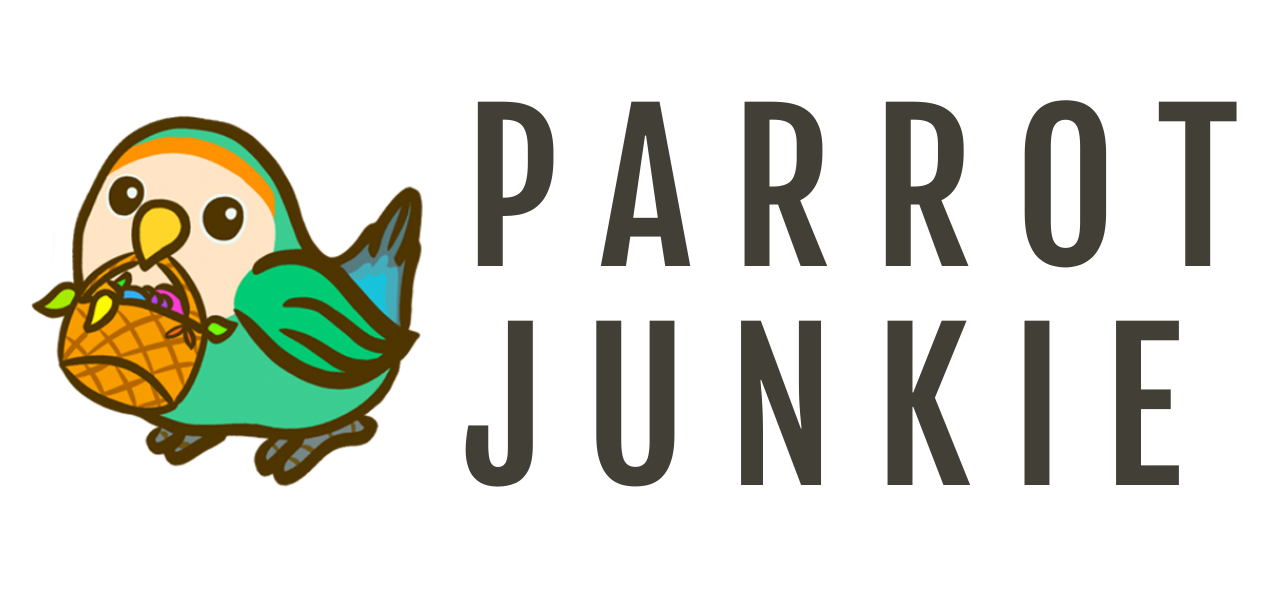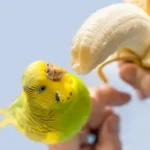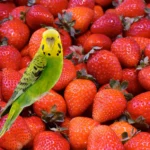
Can Parrots Eat Watermelon (Including Seeds and Rind) – Safe or Toxic?
The image of taking a bite into a juicy and a high water content fruit comes to your mind when you think of a watermelon. Perhaps it could be your favorite fruit. As a parrot owner, you might be wondering if your parrot can eat watermelons as well.
Watermelon is generally safe for parrots. While it might consist of mostly water, it also contains certain amounts of beneficial nutrients that are great for parrots.
THE VERDICT: Can parrots eat watermelon, including seeds and rind? YES, parrots can eat all parts of a watermelon fruit. Read more below!
Jump To Section
Red Watermelon vs Yellow Watermelon

Many watermelons have red flesh while others are yellow. The yellowish color in some of the watermelons is due to lack of lycopene, a carotenoid that is responsible for producing reddish color in fruits. Red watermelons have lycopene. Lycopene is known for antioxidant properties in humans (at this point, I was unable to find relevant studies specifically for parrots). Surprisingly, both types of watermelons have almost the same nutritional content, but the yellow one tends to be a little sweeter in general.
A watermelon fruit consists of three main parts:
- The rind, which is the tougher, outer covering that is usually green in color
- The flesh, which is the juicy part that we eat, usually red or yellow in color
- The seeds, which can be black or white in color
The following is everything you need to know about feeding watermelons to your parrots.
Is Watermelon Good for Parrots?
Each watermelon bite is composed of 90% of water, which is why it’s called a water-based fruit. The high-water content in watermelon is good for hydrating parrots. Proper hydration enhances normal functioning of the heart, liver, and kidney.
While watermelon is mostly good for hydration, it also contains quite an impressive amount of nutrients that play a key role in parrots’ health. Therefore, watermelons can definitely be included when preparing a nutritionally balanced diet for your bird.
Nutritional Benefits of Watermelons to Parrots
Watermelon is an excellent source of antioxidants and amino acids. It’s also very rich in vitamins, minerals, fiber, and amino acids that benefit parrots in various ways.
Vitamins in Watermelons
Watermelon is a good source of vitamin C, vitamin A, and choline. Choline helps in fat metabolism. It is particularly needed for growing birds as it is not always synthesized in the body at sufficient amounts. It facilitates memory regulation as well as muscle and mood control. Parrots need choline to stay sharp.
Vitamin C boosts immunity in parrots as it is a good antioxidant. It enhances growth and repair of tissues in the parrot’s body. You can easily notice a parrot with vitamin C deficiency by simply checking on their feathers. Parrots develop skin rashes and loose feathers with insufficient vitamin C.
Vitamin A is responsible for eyesight, hearing, and feather health. It produces keratin, a protein that makes up the beak and feathers of a parrot. Your bird may have to deal with a lowered immune system without vitamin A.
Minerals in Watermelons
Watermelon contains minerals such as phosphorus and potassium. Phosphorus aids in bone formation and metabolism in parrots. Younger parrots need phosphorus for continuous skeletal growth while the older ones require it for the general maintenance of the tissues and skeleton.
Potassium is an essential mineral that is responsible for:
- Enhancing muscle contractions, nerve signals, and fluid balance in parrots.
- Controlling heart health and blood pressure; thus, enabling parrots to be healthier and more active.
Fiber in Watermelons
Watermelon contains fiber that facilitates the digestion of nutrients by stimulating the movement of the gastrointestinal tract. Low fiber intake in parrots leads to a poor digestive system. So, you need to supplement fiber to avoid reducing the digestibility of nutrients.
Amino acids in Watermelons
Watermelon is a good source of a specific amino acid known as L-citrulline. L-citrulline can be converted into L-arginine, which is an essential amino acid for parrots.
Other Nutrients Found in Watermelon in Small Quantities
- Iron: Produces haemoglobin for the blood to carry oxygen.
- Vitamin B1: Facilitates metabolism of carbohydrates.
- Manganese: Plays a vital role in growth and bone development.
- Magnesium: Enables bone development and cellular metabolism.
- Vitamin B2: Provides energy that’s needed for different physiological functions.
Can Parrots Eat Watermelon Rind?
Watermelon rind is edible, and parrots can comfortably eat it. It’s a good source of amino acids and citrulline that reduces blood pressure and muscle fatigue. However, the rind is often sprayed with pesticides that stick to the waxy coating of the fruit.
You can only allow your parrots to eat the rind if:
- The watermelon is organically grown
- You wash the rind thoroughly to get rid of the pesticides
- You scrape off a few outer layers before offering it your parrot
You can just do away with the rind if your watermelon is not organically grown. There’s no need to risk your parrot’s health. Besides, you may not be able to get rid of all the chemicals by washing the fruit. So, it’s better if you just avoid the rind.
Can Parrots Eat Watermelon Seeds?
Parrots generally love seeds. If you offer them a slice of watermelon with seeds, there’s no doubt they’d go for seeds before the flesh. There’s no need to worry because watermelon seeds are very rich in proteins and minerals, which are essential for your parrot’s health. You may even want to consider sprouting watermelon seeds for your parrots to eat, as sprouted seeds are usually more beneficial and lower in fat.
Watermelon seeds come in either black or white forms. The difference between black and white watermelon seeds is that the black ones are mature seeds that can be planted and grown into new plants, while the white seeds are immature ones that are not ready for planting.
Most of the time, we humans spit out the black seeds as they are tough and unpleasant to eat. But parrots can eat both black and white seeds, and will probably enjoy cracking and chewing them. You can even pick out the black seeds, rinse and dry them, and store them for later feeding. According to University Hospitals, watermelon seeds also contain quite a few nutrients. These nutrients can benefit your parrot, such as calcium, potassium, magnesium, and so on.
Can Parrots Drink Watermelon Juice?

Watermelon juice can be appealing to a parrot as it is refreshing and sweet. You can make the juice by blending the flesh after you have removed the rind. If you have blended the seeds together with the juice, that is also fine as parrots can also eat watermelon seeds. As with any fruit, give juice in moderation.
Is Watermelon Safe for Parrots to Eat?
Watermelon is one of the safest fruits you can offer your parrots. It does not contain any toxic substances that can harm your bird. However, it has to be fresh. Sliced watermelons get spoiled if they are stored for quite a while. Remove the rind to prevent your parrot from eating any chemicals and pesticides that may be present in the rind.
Do Parrots Love Watermelons?
Parrots often love to eat watermelons for the following reasons:
- Watermelon is delicious and sweet
- Their sweet taste complements well with parrots’ sweet tooth
- Watermelons have a crispy texture that parrots really love
However, for parrots that are not used to eating watery, juicy stuff, they may find it aversive initially. My lovebird, Loki, hates anything that is wet, so getting her to even lick watermelon is very difficult!
How to Feed Parrots Watermelons?
First, you need to wash the fruit thoroughly. Rinse it well afterwards. Cut the watermelon into small slices to offer to your parrot. You can offer the watermelon in a bowl or a foraging plate, but ensure the surfaces are clean. You can also offer the watermelon to your parrot by holding it in your hand. If they trust you, they may feel safer if you are offering it to them by hand.
In some cases, dicing the watermelon into tiny, bite-sized chunks may appeal to your parrot more (it depends on the bird). This makes it easier for the parrot to consume. For some birds, though, they may enjoy chewing pieces off of the fruit directly, so you can also try that method if your bird does not seem to eat small chunks.
If you notice your parrot only targeting the seeds, try hiding the seeds deep into the flesh so that your bird would have to dig at the flesh to get to the seeds, and as a result, unwittingly eat some watermelon too.
Be ready to clean the mess once they are done eating! Get rid of any remains if your parrots do not consume all of it as this may lead to an accumulation of bacteria that may harm your bird’s health. Do not leave the watermelon there, even if uneaten, for too long as with any fresh food.
Weird Poop After Feeding Watermelon!
Sometimes, you may encounter weird-looking poop after feeding your birds certain food. This is especially so for colored food as well as juicy ones. If your bird has just eaten watermelon, there is a chance you might observe the following:
- Strangely-colored poop
- Poop with a large proportion of liquids
If your bird has just eaten a large quantity of watermelon, particular the red ones, you might observe that its poop discolors slightly. This is due to the red coloration in watermelon. The color should clear up within half a day after your bird finishes the watermelon.
If the poop has a large proportion of liquid part, it is due to the excess water being consumed by the bird. Just like with humans, if we drink a lot, we also pee a lot – this applies to birds too.
Final Notes
Feeding watermelon to parrots has many plus points as it is hydrating and full of nutrients. You can also feed your parrot the rind (if it is organic) and seeds. But, like any other fruit, you will also need to feed watermelons in moderation. So, you can feed watermelons on a regular basis so long as it’s combined with other fruits, seeds, or vegetables, as part of a balanced parrot diet.
While introducing watermelon, some birds may not react positively if it is their first time encountering it. In this case, you’ll have to gradually introduce the fruit to them until they get used to it, by finding different creative ways to present it to them.
Parrot Junkie www.parrotjunkie.com
Copyright © 2021-2024. All rights reserved.



Be the first to leave a comment